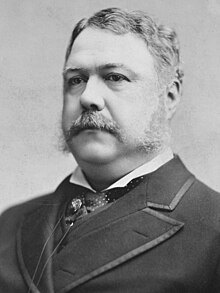Search This Blog
Sunday, April 15, 2012
Chester A. Arthur
Served as president from 1881-1885
Era: Gilded Age
American Identity and Culture
America was becoming a nation of immigrants. Through the 1880s, the majority of immigrants came from northern and western Europe. This included the British Isles, Germany, and Scandinavia. They were known as “old” immigrants and assimilated into American society fairly well due to their mostly English-speaking language and high level of literacy and skills. On the other hand, Chester A. Arthur was also president during an era known as the Gilded Age. This referred to the superficiality of the new wealth that was prominently displayed towards the end of the nineteenth century. Even the election campaigns during this era reflected the emphasis on material objects. The campaigns were characterized by brass bands, flags, campaign buttons, picnics, free beer, and crowd-pleasing speeches. All in all, he was part of an era of “forgettable” presidents.
Economic Transformations and Globalization
Chester A. Arthur went against his political party’s economic goals on several occasions. For example, he pushed for a reduction of tariffs in an effort to relieve farmers and middle class consumers who were in debt. This challenged Arthur’s party, the Republicans, because they tended to side with big businesses and manufacturing. He even appointed a special tariff commission that called for a twenty to twenty-five percent reduction. Congress responded with defiance by passing the “Mongrel” Tariff of 1883, which dropped rates on various items by an average of 1.47 percent. Arthur also vetoed the Rivers and Harbors Act of 1882 and argued that the growing surplus of federal funds should be decreased by tax reductions instead of a decrease in government spending.
Environment
During Arthur’s presidency, his secretary of state James G. Blaine pushed for more direct involvement in Latin America by proposing the construction of a canal across the Isthmus of Panama. Frederick Theodore Frelinghuysen, who was Blaine’s successor, negotiated a treaty with Nicaragua that provided the United States with a stretch of land for the construction of the waterway. Unfortunately, Congress refused to ratify this treaty because the agreement put it at odds with Great Britain, who it already had an existing treaty with pledging that each nation would not obtain exclusive control over any canal built over the Isthmus of Panama.
Politics and Citizenship
Although Arthur was skeptical about civil service reform, he supported the Pendleton Act in 1883. This act established open competitive exams for civil service jobs and officially ended the spoils system, which had previously awarded government jobs in return for party loyalty and was popular under Andrew Jackson. The law also banned salary kickbacks and apportioned federal appointments among the states. Chester A. Arthur also proposed a Chinese Exclusion Act which he signed once it was lowered to a ten-year immigration ban. This was the first time that federal law prohibited entry of a particular ethnic group into the United States.
Slavery and its legacies in North America
William Arthur, Chester’s father, had been opposed to slavery. Chester Arthur shared his father’s feelings. He rose to prominence when he took part in two important cases defending African Americans. In one case, he managed to gain the freedom of eight African Americans who were accused of being runaway slaves. In the other case, he dealt with the issue of segregation. Lizzie Jennings, an African American woman, was not allowed to ride a streetcar in New York City because she was black. Arthur won the case, and the court decided that African Americans had the same right as anyone else to ride a streetcar in New York.
War and Diplomacy
Arthur’s presidency is probably best known for taking the first steps to strengthening and building the modern Navy. He was known as the “Father of the Steel Navy.” Chester Arthur sought to construct steam-powered steel cruisers, steel rams, and steel-clad gunboats. He also fought to remove corruption and incompetency within the Navy. The Naval War College was established in Newport, Rhode Island. This created the Office of Naval Intelligence, and all of this was accomplished under Secretary of the Navy William E. Chandler.
Subscribe to:
Post Comments (Atom)

No comments:
Post a Comment